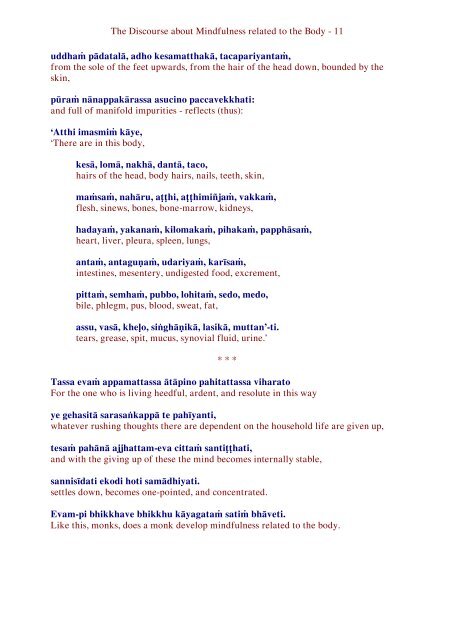Kayagatasatisuttam, the Discourse about Mindfulness related to the Body
A Pāli and English line by line (interlinear) version of this important discourse about the development of various meditations related to the body (together with extensive annotation).
A Pāli and English line by line (interlinear) version of this important discourse about the development of various meditations related to the body (together with extensive annotation).
You also want an ePaper? Increase the reach of your titles
YUMPU automatically turns print PDFs into web optimized ePapers that Google loves.
The <strong>Discourse</strong> <strong>about</strong> <strong>Mindfulness</strong> <strong>related</strong> <strong>to</strong> <strong>the</strong> <strong>Body</strong> - 11<br />
uddhaṁ pādatalā, adho kesamatthakā, tacapariyantaṁ,<br />
from <strong>the</strong> sole of <strong>the</strong> feet upwards, from <strong>the</strong> hair of <strong>the</strong> head down, bounded by <strong>the</strong><br />
skin,<br />
pūraṁ nānappakārassa asucino paccavekkhati:<br />
and full of manifold impurities - reflects (thus):<br />
‘Atthi imasmiṁ kāye,<br />
‘There are in this body,<br />
kesā, lomā, nakhā, dantā, taco,<br />
hairs of <strong>the</strong> head, body hairs, nails, teeth, skin,<br />
maṁsaṁ, nahāru, aṭṭhi, aṭṭhimiñjaṁ, vakkaṁ,<br />
flesh, sinews, bones, bone-marrow, kidneys,<br />
hadayaṁ, yakanaṁ, kilomakaṁ, pihakaṁ, papphāsaṁ,<br />
heart, liver, pleura, spleen, lungs,<br />
antaṁ, antaguṇaṁ, udariyaṁ, karīsaṁ,<br />
intestines, mesentery, undigested food, excrement,<br />
pittaṁ, semhaṁ, pubbo, lohitaṁ, sedo, medo,<br />
bile, phlegm, pus, blood, sweat, fat,<br />
assu, vasā, kheḷo, siṅghāṇikā, lasikā, muttan’-ti.<br />
tears, grease, spit, mucus, synovial fluid, urine.’<br />
* * *<br />
Tassa evaṁ appamattassa ātāpino pahitattassa vihara<strong>to</strong><br />
For <strong>the</strong> one who is living heedful, ardent, and resolute in this way<br />
ye gehasitā sarasaṅkappā te pahīyanti,<br />
whatever rushing thoughts <strong>the</strong>re are dependent on <strong>the</strong> household life are given up,<br />
tesaṁ pahānā ajjhattam-eva cittaṁ santiṭṭhati,<br />
and with <strong>the</strong> giving up of <strong>the</strong>se <strong>the</strong> mind becomes internally stable,<br />
sannisīdati ekodi hoti samādhiyati.<br />
settles down, becomes one-pointed, and concentrated.<br />
Evam-pi bhikkhave bhikkhu kāyagataṁ satiṁ bhāveti.<br />
Like this, monks, does a monk develop mindfulness <strong>related</strong> <strong>to</strong> <strong>the</strong> body.

















